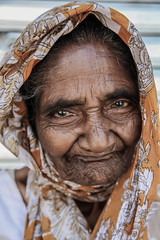Blog Action Day – Poverty
Posted by Mitch Mitchell on Oct 15, 2008
I encountered real poverty head on when my dad went to Vietnam back in 1969. For some reason, when he went overseas we couldn’t live in on base housing; I never learned the reason why. So, last minute we ended up moving to Kansas City, Missouri, to live with my grandmother.
 via Compfight |
When my grandmother had bought her house in 1957, it was considered a nice, middle class black neighborhood. As the years went by the neighborhood deteriorated, and by the time we got there it was on the fringe of the slums. By fringe, I mean that on our immediate street on the block there were still some fairly nice looking houses, my grandmother’s house included, but in between there were some squalor houses.
At the front end of the block was a former Red Ball Moving Company lot, with the remnant of a trailer on a rock lot that had been torched and tortured to the point that you knew what it had been, but it had obviously been used for other purposes. The rock lot was chopped up, as if someone had taken a sledge hammer to it, and the building was empty, though all the windows had been broken out of it.
The front end of the block offered some salvation, in its own way. If you turned right on that main road and drove about 15 or 20 minutes, you were in downtown Kansas City, where all the tall buildings were; if you went 15 or 20 minutes to the left, you ended up closer to the suburbs, where there was a Boys Club and actual fast food restaurants, none of which existed where we lived.
There was a little general store one block to the left, and two blocks up was the elementary school I went to. The back end of the block began the true slum part, houses with boarded up windows with people still living in them; trash in the yards, beaten up old cars and no real place for kids to play except the streets. There was no baseball or football, or even basketball; the only basketball court was at the school, and it was fenced off except during gym class.
It had to be; this was a dangerous neighborhood where fights and gunshots went off all the time. The Black Panthers had a purple van with a black paw that they used to drive down the streets from time to time. And we even saw a man running from the police this one time, who decided to run down the side of our house, and as the police officer pulled his gun and yelled something at the man, we all thought the gun was being aimed at our window and we jerked back; talk about being scared as a 10 year old kid.
 via Compfight |
At my school, at least a third of the kids came to school often wearing the same clothes every day. Our teacher, Mrs. Johnson, used to spend the first 45 minutes to an hour taking kids into the bathroom, which each classroom had, and washing them up; she didn’t believe that being poor meant you couldn’t be clean. Some kids had holes in their clothes and in their shoes.
Many kids didn’t have money for either lunch or breakfast, but this was before they started having school breakfast programs; luckily, we did have a school lunch program, and for many of these kids, it might have been the only real meal they got during the day. The school was way behind me, so I got no attention in school, but it didn’t matter. There was no homework ever, because the school didn’t want to take a chance on the books not making it back to school. They had a library that was rarely used, mainly because they had a hard time teaching many of the kids to read. They weren’t dumb kids, they were just unmotivated; what did they know? What did they see everyday when they went home?
I learned a big lesson one particular day. My best friend, named Odell Jones, used to come over to my house to play my games. Seems I was the only person who had any games; I didn’t know that at the time. One day we went for a short walk, and for the first time I ended up on the street at the back end of my block. We walked up about halfway, and he pointed out his house. It was a tiny ranch house, no glass in the windows, only a curtain pulled across. His parents were sitting out front in rocking chairs. His father was blind and didn’t work; his mother was partially blind and didn’t work either. Both were sitting on the porch in dirty clothes. There were 4 other children around them, but they weren’t playing in the yard, but sitting on the porch with their parents; until that time, I thought he only had an older sister, as he’d never talked about his family.
As I looked up the street, I saw many other houses like this one; I was confused and scared, and we didn’t go any further. I’m usually a curious sort and like to look around, but I decided not to take any chances. I didn’t fit in already, and I didn’t want to draw any more attention to myself than I already had in school, where you can believe I wasn’t overly popular. We weren’t rich by any means, as the military doesn’t pay great, but comparatively, I was living well.
Or was I? Sure, I had some things, but my grandmother’s house had deteriorated in its own fashion after so many years. It had rats and mice, roaches and huge water bugs. My mother spent all her time in her bedroom upstairs; she rarely came out and rarely went downstairs. She drove to the air force base nearby for her foodstuffs, and kept everything in her room so she didn’t have to leave. You know she wasn’t used to living this way either. My grandmother is the type who can get by anywhere; all she wants is a place to sleep at night, even now.
 |
After a year of that my dad came back from Vietnam, and we moved to Maine, where we encountered a much different kind of life. It took me a long time to get adjusted to it; how does one go from a predominantly black slum area (we had one Mexican kid in school, otherwise it was all black) back to military living, where there are no hardships because food and supplies on a military base cost less, life is easier, the grounds must be maintained so there is no squalor, and of course I was once again back in the minority? It was tough, for sure.
I always thought back on my experiences in Kansas City, and it gave me a better appreciation for what I had, as well as a compassion for those who don’t have as much as I have. I have always given money when I can, though I admit that I don’t volunteer as much as I probably should. I feel I have a unique point of view whenever I hear someone talking about poverty and sloth and the educational system and Medicaid and food stamps and putting people down who live in these kinds of conditions. Nobody asks to live like that; sometimes, those are just the circumstances people face in their lives.
In 1999, I had an opportunity to go back to Kansas City for the first time in almost 30 years, and I said I wanted to go back to the old neighborhood. It might not have been safe, but I wanted to go anyway. Oddly enough, it’s probably safer now, though it’s no less a ghetto area. More than half of the houses on my old street have been torn down, and all that remains is a paved over area where basements used to be; one of these houses was my grandmothers.
The school I went to is also gone; I can’t believe they tore down an entire brick building, but they did, and there was nothing there at all except more slab. The store was gone, but, oddly enough, that same lot was sitting there empty, the one with the old Red Ball trailer; that was gone, though. It was summer, but I didn’t see any people. Then I had to think back; I rarely saw people when I lived there. So, it was a different kind of poverty; this poverty could hide behind doors, but it was still there.
I was sad; after 30 years, it wasn’t actually worse, but it wasn’t better. How does that happen in America? For that matter, how does it happen anywhere in this world of prosperity? I guess I’ll never know, and no one else will ever know, but it always reminds me of that one line from Jesus Christ Superstar, which is not a direct quote from the Bible, though many people think it is: "There will be poor always."
If you get a chance, please go to my other blog to read what I wrote there on this same topic today.


Isn’t it something today to realize we were poor back then but we were really rich in spirit. Posts like this make me reflect back on my own life and upbringing.
Beverly Mahone´s last blog post..Marketing in Uncertainty
@Beverly Mahone, Thanks for your comment, Bev. It’s certainly a different perspective from a child than an adult, because as an adult I know I couldn’t have stayed in that house or neighborhood longer than a couple of days. Some people just can’t get away from poverty, though, and that’s sad.
Hey Mitch,
It was nice meeting you at the Chamber Mixer the other night. Thanks for telling me about Blog Action Day. I will definitely take part in it next year. I really enjoyed your post. Would you like to exchange blogrolls? I listed our blog in the website section. I look forward to hearing from you.
Monica Walsh´s last blog post..How Much Does it Cost to Build a Quality Website?
Hi Monica; glad you stopped by for a visit. I’d love to exchange blogrolls with you; thanks for the offer.
That’s very moving, Mitch. I don’t know, but I think one of the worst things about the kind of poverty you describe must be the sense of hopelessness. Blog Action Day might not have changed a lot but I would hope that just in leading you and others to share stories such as you have it will have helped some of us to understand better and have more compassion. Dorothy Day, who worked with the poor and inspired many others, said what was needed for all of us was a “revolution of the heart”. “The greatest challenge of the day is how to bring about a revolution of the heart, a revolution which has to start with each one of us.” Thank you for your contribution to that revolution.
Des Walsh´s last blog post..Daily Blog Cruise Choice Posts
Thanks for your comments, Des. I like to think that everyone who participated in the Blog Action Day revolution found a way to touch someone who hadn’t felt it in their lives in some way. I read a bunch of posts over a two day period, and it really brought this subject home to me.